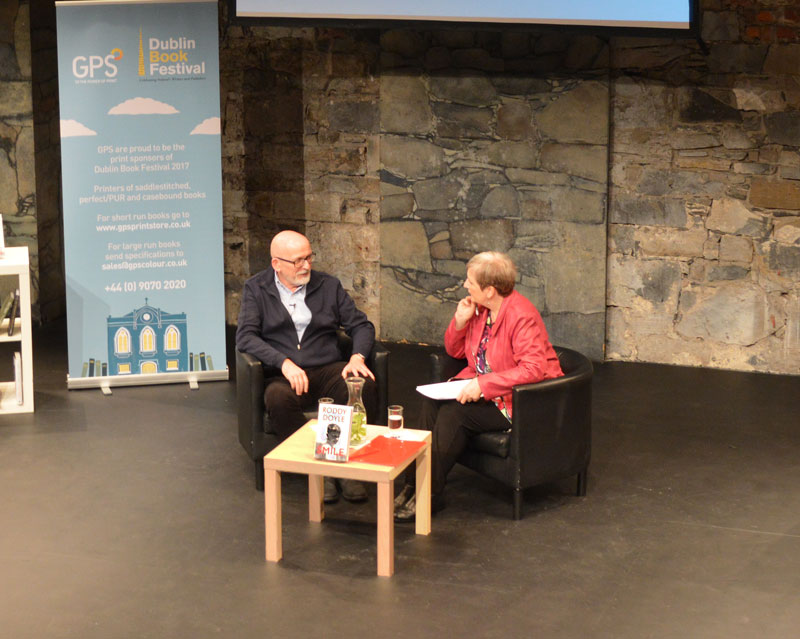Dublin Book Festival is the annual highlight of literary focused events held in the city for many a bookworm. The week-long line up caters for fans of all ages and genres. The Saturday line up of this year’s programme proved to be jam-packed and exciting, and every event I had the pleasure of attending was thought-provoking and well put together.
Caitríona Perry was interviewed by Brian Dobson in the National Library on her recently released book In America: Tales from Trump Country. The hour-long talk was intriguing, and audiences posed a range of questions to Perry about her travels in and experiences of the Trump-era United States. The conversation was anecdotal, much like the book, and Perry’s insights bring a personal angle to the news stories we have been consuming over the last year. She also discussed her journalistic career, noting that the time difference and on-the-road-nature of her demanding four-year stint as RTÉ’s Washington Correspondent has been tough, but rewarding. The book comprises of all the experiences she has had of the country that didn’t manage to make the air, and this side project was completed rapidly during the summer months of this year.
Following this talk, I attended a panel discussion called Dublin Histories, with historians turned authors Donal Fallon, John Gibney and Aileen O’Carroll being interviewed by <em<Drivetime’s Myles Duggan. The conversation revolved around the new Dublin-based history books recently released by each author, and moved to wider topics of the state of Irish history, and historians’ varied approaches to documenting it. Fallon started a blog, “Come Here to Me!”, in 2009, which is based around bite-sized examinations of the social history of Dublin. He reiterated a message I was to hear across the weekend’s events – that print culture isn’t dead. He noted that “the first thing that happens when something becomes popular online is its attempted move to print”. This was indeed the case for Fallon, as his blog became the source material for his book.
The line-up’s pinnacle was, for me, an author interview with Roddy Doyle, taking the headline slot on Saturday evening in Smock Alley Theatre. Smock Alley acts as a base for the festival. Upstairs, a Winter Garden space was installed, along with a pop-up bookshop, plentifully stocked by the Gutter Bookshop. Audiences can buy copies of books they’ve just learned about during author talks, and also mingle with the authors themselves as they frequent the space for casual book signings throughout the festival.
Both Doyle and his interviewer Catherine Dunne, who is an accomplished author of 10 novels and recipient of the 700th anniversary Giovanni Boccaccio International Prize for Fiction, stayed back in the space. I had the pleasure of chatting to them after the talk, and Doyle signed a copy of his Barrytown Trilogy for me, along with a copy of his latest release, Smile.
Smile is Doyle’s 11th novel, and, as is usual with his works, its story illuminates a problematic era of Irish social history, interrogating issues that remain prevalent in contemporary social debate. The novel deals with sexual abuse by Christian Brothers in the Irish school system of the 1970s, and the story revolves around Victor, a child protagonist who narrates his experiences. Doyle drew heavily from his own upbringing for the book, and although he was not the victim of such abuse, many of his school mates were. Dunne steers the conversation around many topics, from Doyle’s early career, to Smile, to dealing with bad reviews and serious death threats, to the writing process, his sources of inspiration, the state of Irish society and beyond.
She has a long-standing history of working with Doyle, and their warm conversation is one between two old friends. Dunne had done her research, however, with a stack of papers in her lap and apparently relishing the opportunity to interrogate Doyle on every aspect of his life and career. The pairing is exemplary, and when introducing the talk Programme Director Julianne Mooney conceded that she found it difficult to source an interviewer that would bring out the best in Doyle, and that would know him well. She succeeded, and the event proved to be a roaring success as the theatre was packed to capacity.
Throughout the conversation, Doyle radiated his trademark cynical humour, and even when talking about physical and sexual abuse he managed to draw laughter from his audience (though often this laughter felt nervous and uncomfortable). Audience questions ranged from asking about how he gets to know his characters to how he stores his manuscripts. I questioned him on his process of writing for children, noting that the Giggler Treatment was a firm favourite of mine as a child.
In his children’s books, Doyle retains and distills an Irish sense of humour like no other author, and he notes that this was made possible by recounting episodes of his own daily life raising his three children. He said he only wrote for children because he had children and he was inspired by and wrote for his own. He won’t venture into the genre again unless grandchildren come along, he says. He also notes how it’s funny to encounter grown adult fans of the Giggler Treatment now: “I was in a coffee shop recently and some 6 ft 5 fella with a massive beard was making my latte while tearing up and telling me how much he loved it as a kid.”
I left the talk inspired not just as a writer, but as a person. Doyle remains one of the most outstanding Irish authors of our time. He retains elements of the absurd that continually bring humour to his dealings with tough subjects and situations, and he keeps his ear to the ground and a finger on the pulse of Irish society – particularly Dublin – like nobody else. His prolific writing gives the city a telling social portrait spanning decades, and this made him a fitting headliner for the city’s finest literary festival.







